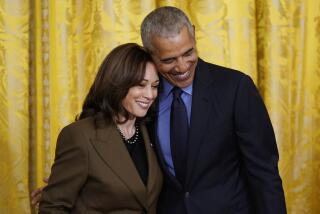McCain gets Bush’s blessing
- Share via
WASHINGTON — Eight years ago, their bitter rivalry came to a head in South Carolina when George W. Bush put an end to John McCain’s presidential bid. Now they are standing side by side, with McCain the nearly anointed Republican nominee and Bush the most prominent endorser.
Bush wrapped the Arizona senator in a brief political embrace Wednesday, just about when McCain would want it: eight months out from election day.
Given the public’s low opinion of the president, Democratic and Republican political operatives said, the further away from the election that that endorsement took place the better. And with the race for the Democratic presidential nomination still neck and neck, what better time than when attention is focused on Sens. Hillary Rodham Clinton and Barack Obama?
Bush delivered unstinting praise for McCain just as eight years ago he undid the senator’s emergent campaign with unstinting attacks that undercut him among South Carolina conservatives just as he was gaining momentum.
Standing on the edge of the White House Rose Garden in late-winter sunshine, Bush praised McCain’s “incredible courage and strength of character and perseverance” in fighting back from political near-death last year.
“That’s exactly what we need in a president: somebody that can handle the tough decisions, somebody who won’t flinch in the face of danger,” the president said, jumping ahead of himself to add: “He’s a president, and he’s going to be the president who will bring determination to defeat an enemy and a heart big enough to love those who hurt.”
Bush never used any variation of the word “endorse,” and it fell to McCain to twice thank Bush for “his endorsement.”
McCain brought up the touchy subject of the 2000 race, saying that they would once again be on the campaign trail together, “only [in] slightly different roles this time.”
On March 5, 2000, McCain suggested in a television interview that Bush was “not ready for prime time” and refused to pledge to support Bush should he win the Republican nomination. Four days later, McCain ended his campaign.
Bush and McCain spent about an hour at a private lunch in the dining room adjacent to the Oval Office, eating hot dogs. The two discussed overall campaign strategy after heading to the dining room -- without a pause to try out the president’s desk chair.
“I didn’t measure the drapes,” McCain told reporters later.
“It was a very pleasant conversation, and I appreciated the allocation of his most precious asset, which is his time,” McCain said. Making the rounds of the party hierarchy one day after sewing up the nomination, he also met with the chairman of the Republican National Committee, Mike Duncan.
The question going forward, however, is just how much of Bush’s time will the McCain campaign want to use?
In the most recent Los Angeles Times/Bloomberg poll, conducted between Feb. 21 and 25, 62% of those surveyed disapproved of Bush’s job performance and 34% approved -- raising questions about how much good he can do for McCain.
“Bush’s endorsement is a two-edged sword. It certainly helps with the Republican base. On the other hand, it doesn’t give any advantage to McCain with the independent voters, who seem like the decisive vote this year,” said Kenneth M. Duberstein, President Reagan’s chief of staff during the successful 1988 presidential campaign of Vice President George H.W. Bush.
It is unclear whether the McCain campaign will use the current president to bring in donations out of the spotlight, to visit Republican districts to build enthusiasm among conservative allies for the Republican ticket or to speak at rallies in swing states -- a course that might too closely identify McCain with him.
“To the extent that Sen. McCain wraps himself in the ‘popularity’ of President Bush or wraps himself in his foreign policy or wraps himself in his agenda, he does so at his own peril,” said Michael Feldman, who played a key role in Vice President Al Gore’s Democratic presidential race in 2000 but is not affiliated with either Democratic hopeful this year.
In the Rose Garden, Bush acknowledged his own low standing with voters and said he would do whatever would help the senator -- including campaign against him. “If my showing up and endorsing him helps him, or if I’m against him and it helps him -- either way, I want him to win,” Bush joked.
The president, who had placed Dick Cheney in charge of presenting him with a list of vice presidential candidates in 2000, said he would offer one piece of advice to his would-be successor: “Be careful about who he names to be the head of the [vice presidential] selection committee.”
On his way to a fundraising event in West Palm Beach, Fla., McCain said he and Bush had spoken about how to select a running mate.
He said he had not yet named anyone to lead the search, and aides said it could be months before he decides whom to pick.
--
maeve.reston@latimes.com
More to Read
Sign up for Essential California
The most important California stories and recommendations in your inbox every morning.
You may occasionally receive promotional content from the Los Angeles Times.














